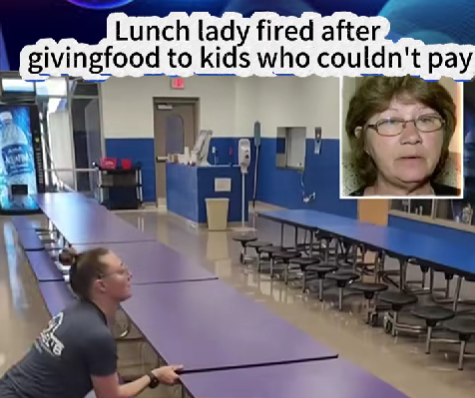A small-town cafeteria worker has become an unlikely hero — and a symbol of compassion — after she was fired for giving free lunches to students who didn’t have enough money to pay. The story has ignited national outrage, with parents, teachers, and even strangers online rallying to her defense.
According to reports, Margie Collins, a long-time cafeteria worker at a local elementary school, was terminated after repeatedly giving meals to children whose lunch accounts were empty. The school district claimed she violated policy by distributing food without payment, but to many in the community, Margie’s actions were nothing short of humane.
For nearly a decade, Margie was known as “Miss Margie” — the kind woman behind the counter who always had a smile, a kind word, and a few extra apple slices for kids having a rough day. Colleagues say she often paid out of her own pocket when students couldn’t afford their meals. “She’d rather skip lunch herself than let a child go hungry,” said one co-worker.
The incident reportedly began when a new payment policy was introduced, requiring strict enforcement of balances on student accounts. One afternoon, a young student in tears told Margie he didn’t have any money left on his card. Rather than send him away hungry, she quietly handed him a tray of food. When school administrators found out, she was written up. But Margie didn’t stop.
“I wasn’t going to let a child sit there and watch others eat,” she said in a local interview. “No kid should be punished for being poor.”
After being caught a second time, Margie was officially fired. The decision sparked immediate backlash. Parents flooded social media, calling the school’s actions “heartless” and “disgraceful.” A petition demanding her reinstatement gathered thousands of signatures within days.
One parent wrote, “If compassion is a fireable offense, what message are we sending to our children?” Another added, “She did what any decent human being would do — she fed a hungry kid.”
The district defended its policy, stating that cafeteria workers must follow “federal lunch program guidelines,” which prohibit distributing unpaid meals. However, the growing outrage has put immense pressure on administrators to reconsider.
Margie’s story has also reignited national discussion about school lunch debt, an issue affecting millions of children across the United States. According to advocacy groups, thousands of schools deny meals to students with unpaid balances — sometimes even throwing away their food in front of classmates.
Experts argue that no child should be caught in the middle of financial bureaucracy. “We have systems to track debt,” said child nutrition advocate Lauren Harris. “But hunger doesn’t wait for paperwork.”
Despite losing her job, Margie says she has no regrets. “I might’ve broken a rule,” she said softly, “but I didn’t break my heart.”
As donations and job offers pour in from supporters nationwide, Margie’s act of kindness has become a rallying cry — a reminder that empathy is priceless, and sometimes, doing the right thing costs more than it should.
